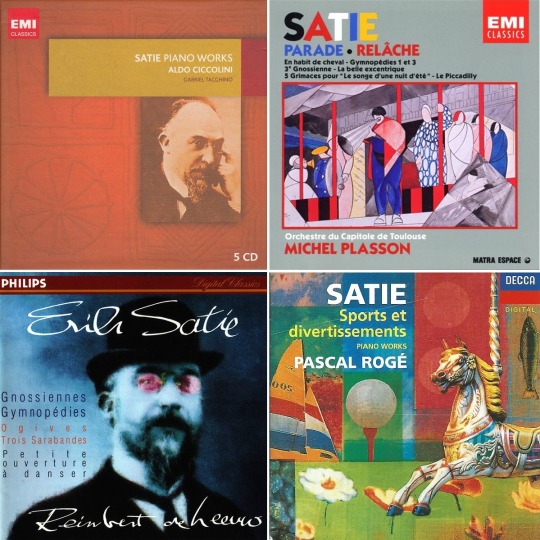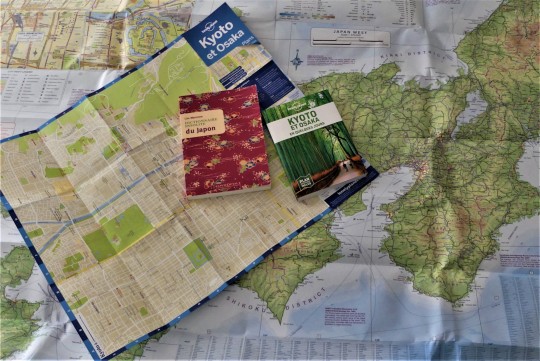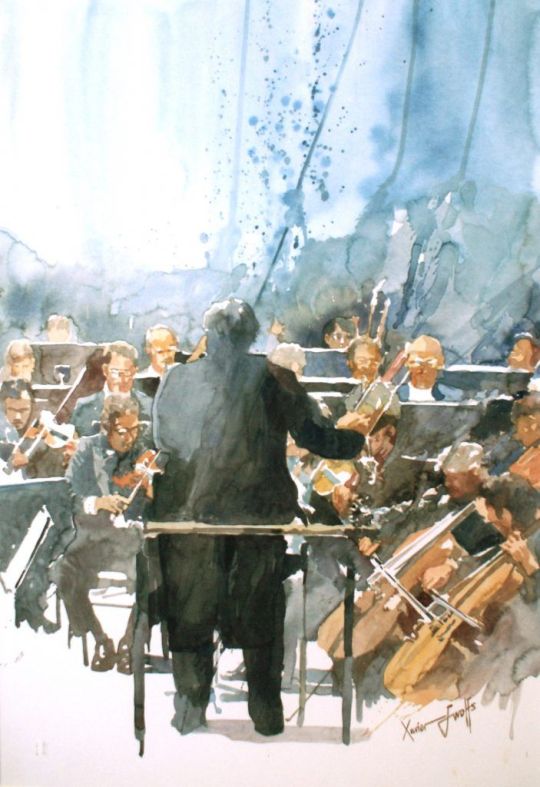#Michel Plasson
Text
Day Six Hundred and Eighty Three
L’amour est un oiseau rebelle
Que nul ne peut apprivoiser
Et c’est bien en vain qu’on l’appelle
S’il lui convient de refuser
Rien n’y fait, menace ou prière
L’un parle bien, l’autre se tait
Et c’est l’autre que je préfère
Il n’a rien dit mais il me plait
2 notes
·
View notes
Text
De Québec
André Mathieu (18 febbraio 1929 - 1968): Concerto romantique (ovvero Concerto de Québec) per pianoforte e orchestra (1943). Philippe Entremont, pianoforte; Orchestre du Capitole de Toulouse, dir. Michel Plasson.
Allegro moderato
Andante
Allegro con brio
View On WordPress
0 notes
Text

Erik Satie (1866-1925)
Works
· Playlist
Aldo Ciccolini · Reinbert de Leeuw · Pascal Rogé · Michel Plasson
1 note
·
View note
Text
omg debussy released a new album🔥🔥🔥
1 note
·
View note
Text
Opera on Youtube 4
L'Elisir d'Amore (The Elixir of Love)
Maggio Musicale Fiorentino, 1967 (Carlo Bergonzi, Renata Scotto; conducted by Gianandrea Gavazzeni; no subtitles)
Metropolitan Opera, 1981 (Luciano Pavarotti, Judith Blegen; conducted by Nicola Rescigno; Spanish subtitles) – Part I, Part II
Metropolitan Opera, 1991 (Luciano Pavarotti, Kathleen Battle; conducted by James Levine; English subtitles) – Part I, Part II
Vienna State Opera, 2005 (Rolando Villazón, Anna Netrebko; conducted by Alfred Eschwé; English subtitles)
Theatro da Paz, Brazil, 2013 (Atalla Ayan, Carmen Monarcha; conducted by Emiliano Patarra; Brazilian Portuguese subtitles)
Teatro Manoel, Malta, 2015 (Cliff Zammit Stevens, Shoushik Barsoumian; conducted by Philip Walsh; English subtitles)
Vienna State Opera, 2017 (Dmitry Korchak, Olga Peretyatko; conducted by Marco Armiliato; no subtitles) – Part I, Part II
Ópera de Bellas Artes, Mexico City, 2017 (Ramón Vargas, Olivia Gorra; conducted by Guido Maria Guida; Spanish subtitles)
Vienna State Opera, 2018 (Benjamin Bernheim, Andrea Carroll; conducted by Frédéric Chaslin; no subtitles)
San Francisco Opera, 2023 (Pene Pati, Slávka Zámečníková; conducted by Ramón Tebar; English subtitles)
Hänsel & Gretel
Vittorio Cottafavi studio film, 1957 (Fiorenza Cossotto, Jan Poleri; conducted by Nino Sanzogno; sung in Italian with Italian subtitles)
August Everding studio film, 1981 (Brigitte Fassbaender, Edita Gruberova; conducted by Georg Solti; English subtitles)
Leipzig Opera, 1981 (Annelott Damm, Steffi Ullmann; conducted by Horst Gurgel; no subtitles)
Julliard Opera Center, 1997 (Jennifer Marquette, Sari Gruber; conducted by Randall Behr; English subtitles)
Opera Australia, 1992 (Suzanne Johnston, Christine Douglas; conducted by Johannes Fritzsch; sung in English)
Vienna State Opera, 2015 (Daniel Sindram, Ileana Tonca; conducted by Christian Thielmann; English subtitles)
Pacific Northwest Opera, 2015 (Sylvia Szadovszki, Ksenia Popova; conducted by Clinton Smith; sung in English with English subtitles)
Scottish Opera, 2020 (Kitty Whately, Rhian Lois; conducted by David Parry; sung in English with English subtitles)
Eklund Opera Program, 2020 (Christine Lee, Anna Whiteway; conducted by Nicholas Carthy; sung in English with English subtitles)
Amarillo Opera, 2021 (Sarah Beckham-Turner, Patricia Westley; conducted by Carolyn Watson; English subtitles)
Turandot
Mario Lanfranchi studio film, 1958 (Lucilla Udovick, Franco Corelli; conducted by Fernando Previtali; English subtitles)
Vienna State Opera, 1983 (Eva Marton, José Carreras; conducted by Lorin Maazel; no subtitles)
Royal Opera House, Covent Garden, 1986 (Gwyneth Jones, Franco Bonisolli; conducted by Jacques Delacote; English subtitles)
Forbidden City, Beijing, 1998 (Giovanna Casolla, Sergej Larin; conducted by Zubin Mehta; no subtitles)
Teatro alla Scala; 2001 (Alessandra Marc, Nicola Martinucci; conducted by Georges Prêtre; French subtitles)
Gran Teatre del Liceu, 2009 (Anna Shafajinskaia, Fabio Armiliato; conducted by Giuliano Carella; English subtitles)
Chorégies d'Orange 2012 (Lise Lindstrom, Roberto Alagna; conducted by Michel Plasson; French subtitles)
Wichita Grand Opera, 2015 (Zvetelina Vassileva, Ricardo Tamura; conducted by Martin Mazik; no subtitles)
Teatro de Bellas Artes, Mexico City, 2017 (Gabriela Georgieva, Carlos Galván; conducted by Enrique Patrón de Rueda; Spanish subtitles)
Opera Hong Kong, 2018 (Oksana Dyka, Alfred Kim; conducted by Paolo Olmi; English subtitles)
Eugene Onegin
Prince Regent Theatre, Munich, 1965 (Hermann Prey, Ingeborg Bremert; conducted by Joseph Keilberth; sung in German; no subtitles)
Paris Opera, 1982 (Benjamin Luxon, Galina Vishnevskaya; conducted by Mstislav Rostropovich; French subtitles)
Kirov Opera, 1984 (Sergei Leiferkus, Tatiana Novikova; conducted by Yuri Temirkanov; English subtitles)
Chicago Lyric Opera, 1985 (Wolfgang Brendel, Mirella Freni; conducted by Bruno Bartoletti; Spanish subtitles)
Petr Weigl film, 1988 (Michal Docolomanský dubbed by Bernd Weikl, Magda Vásáryová dubbed by Teresa Kubiak; conducted by Georg Solti; English subtitles)
Festspielhaus Baden-Baden, 1998 (Vladimir Glushchak, Orla Boylan; conducted by Gennadi Rozhdestvensky; English subtitles) – Act I, Act II, Act III
Palau de les Arts Reina Sofia, Valencia, 2011 (Artur Rucinski, Kristine Opolais; conducted by Omer Meir Wellber; no subtitles) – Part I, Part II
Teatro Comunale di Bologna, 2014 (Artur Rucinski, Amanda Echalaz; conducted by Aziz Shokhakimov; English subtitles)
Mariinsky Theatre, 2015 (Andrei Bondarenko, Yekaterina Goncharova; conducted by Valery Gergiev; French subtitles)
Livermore Valley Opera, 2019 (Morgan Smith, Antonina Chehovska; conducted by Alex Katsman; English subtitles)
#opera#complete performances#youtube#l'elisir d'amore#the elixer of love#hänsel und gretel#hansel and gretel#turandot#eugene onegin#gaetano donizetti#engelbert humperdinck#giacomo puccini#pyotr ilyich tchaikovsky
14 notes
·
View notes
Audio
Toulouse Capitole Orchestra/Michel Plasson - Gymnopédies - III. Lent Et Grave
Get it here.
12 notes
·
View notes
Text
youtube
Henri Duparc (1848-1933) - Aux étoiles ·
Orchestre du Capitole de Toulouse · Michel Plasson
3 notes
·
View notes
Photo



Samedi
Le ciel du matin, vers l’orient où mes yeux plus que jamais se tournent. Encore une cinquantaine de jours d’attente, mais je me prépare, et je me souviens (ci-dessus, le Pavillon d’or, à Kyôto). Le temps s’étire, je trompe comme je peux mon impatience, par exemple en lisant “Trio” de William Boyd, et en écoutant sans fin l’album “Caravane” de Raphaël ou “Carmina Burana”, de Carl Orff, sous la direction de Michel Plasson (version que j’ai eu l’émotion d’applaudir dans les années 1990 au Zénith de Toulouse). Il fait doux, le soleil brille ; en ville, toutes les terrasses sont prises. Allez, je sors...
9 notes
·
View notes
Text
youtube
2.- Fortune plango vulnera (Carmina Burana - C. Orff)
Orfeón Donostiarra
Orchestre du Capitole de Toulose
Michel Plasson, dir.
0 notes
Text
Genèse des œuvres (vidéo en ligne)
2018 - Réalisateur-rice : Plasson, Fabien
Chorégraphe(s) : Cherkaoui, Sidi Larbi (Belgium) Lambert, Fabrice (France) Quaglia, Rita (Italy) Gallotta, Jean-Claude (France) Kelemenis, Michel (France) De Keersmaeker, Anne Teresa (Belgium) Monnier, Mathilde (France) Brown, Trisha (United States) Fiadeiro, João (Portugal) Wolliaston, Elsa (France) Touzé, Loïc (France)
Auteur : Centre national de la danse
"Pour la chorégraphe Mathilde Monnier, « au début d’un projet, on devrait juste avoir à écrire : “Voici les désirs, l’état des désirs de ce projet…” On devrait juste décrire un espace, une idée, donner des notes en désordre, un carnet de notes, une image, ou décrire un mouvement, un paysage, donner quelque chose d’opaque, en pagaille… » [1]. Et pourtant, quoi que l’artiste ait pu dire de la genèse de son projet, prévient-elle, « ce que vous lisez dans la note d’intention n’est en aucun cas ce que vous verrez. »
De fait, un spectacle de danse se crée généralement en plusieurs étapes qui se situent entre le moment où s’énonce un désir initial qui lance le projet, et celui de la première représentation. Quel est, au juste, le point de départ d’une œuvre chorégraphique ? Qu’est-ce qui donne envie à un artiste de commencer un nouveau projet pour s’y consacrer ensuite pendant plusieurs mois ?
Le déroulement du processus de création varie sensiblement selon les chorégraphes. Et, en danse contemporaine, le choix du processus à mettre en œuvre fait partie intégrante de la création. Selon les artistes, les différentes étapes (conception, structuration, répétitions) se chevauchent, se suivent ou se confondent. Elles n’ont pas forcément la même importance. Pour certains, la phase de la conception sera déterminante, tout comme l’idée de départ. Pour d’autres, ce sera celle des répétitions et les principes mis en œuvre dans le temps d’élaboration en studio du spectacle.
Le travail avec les danseurs joue parfois un grand rôle dans la structuration d’une œuvre ou, au contraire, permet surtout de concrétiser ce qui a été décidé en amont par le chorégraphe. Enfin certaines propositions, notamment dans la « composition en temps réel » ou dans l’improvisation, s’appuient sur l’élaboration de la chorégraphie devant les yeux des spectateurs.
Ce sont quelques-unes de ces différentes modalités de « genèse » des œuvres que propose d’explorer ce Parcours."
[1] Mathide Monnier, Jean-Luc Nancy, Allitérations – Conversations sur la danse, Galilée, 2005 p. 75 et 76.
0 notes
Text
Shakespeariana - XXIX
Ivresse de jeunesse
Charles Gounod (1818 - 1893): «Je veux vivre», Juliette’s valse-ariette (waltz song) from the 1st act of the opera Roméo et Juliette (1867), libretto by Jules Barbier and Michel Carré, based on Romeo and Juliet by William Shakespeare. Natalie Dessay, soprano; Orchestre du Capitole de Toulouse conducted by Michel Plasson.
Ah!
Je veux vivre
Dans ce rêve qui m’enivre
Ce jour…

View On WordPress
#Charles Gounod#Jules Barbier#Michel Carré#Michel Plasson#Natalie Dessay#Orchestre du Capitole de Toulouse#William Shakespeare
0 notes
Photo

Mercredi 12 octobre 2022 à 19H, nouvelle émission de la Petite Boutique Fantasque avec la lecture d'une nouvelle histoire désobligeante de Léon Bloy, Une idée médiocre. Mais comme titre j'ai préféré Chaste comme un clou, comme un sécateur, comme un hareng-saur. J'ai hésité avec : Il était si chaste qu'il eut condamné la jupe des zouaves. Cette émission a été enregistrée et montée au studio de RadioRadioToulouse et diffusée en hertzien, Toulouse : 106.8 Mhz ou en streaming https://www.radioradiotoulouse.net/ et pour tout le reste du temps sur les podcasts de mixcloud.
Programmation musicale :
1) Madrigal, Pastorale et Ouverture tirés de Masques et bergamasques (Gabriel Fauré) Orchestre national du Capitole / Michel Plasson
2) A pair of brown (Cat Power)
3) Comme avant (Joranne)
4) Flying home (Art Tatum)
5) Ça va, ça vient (Pierre Barouh)
6) Under heavy manners (Robert Fripp / David Byrne)
+ la lecture de la nouvelle : Une idée médiocre de Léon Bloy lue par Stéphane
Pour ceux qui auraient piscine indienne, ou toute autre obligation, il y a une possibilité de rattrapage avec les podcasts de la PBF : https://www.mixcloud.com/RadioRadioToulouse/une-idée-médiocre-la-petite-boutique-fantasque/
Sus aux Béotiens !
0 notes
Audio
Symphony In D Minor - III. Allegro Non Troppo
By Composer César Franck
Performed By Conductor Michel Plasson And The Orchestre Du Capitole De Toulouse

Orkestleider. Le chef d'orchestre. By Artist Xavier Swolfs
#symphony in d minor#cesar franck#belgian composers#romantic period#classical music#audio#audio post#il nero virtuoso
56 notes
·
View notes
Text
Month of New Operatic Works, Round 2, #19: Hérodiade (1995 Plasson recording)
Owing to a headache arising from my sleep schedule going completely bonkers last night (passed out sometime around 9 PM, woke up about 2 hours later, and have not been able to fall asleep since), I opted to listen to this recording instead of watching the 1984 Liceu production of this, the most famous Massenet opera with which I was by and large unfamiliar (I’d only heard two of the opera’s big arias, “Il est doux, il est bon” and “Adieu donc, vains objets”).
Update: uhhhhhhhh so this is how my initial experience went
me: *curls up on the sofa in the living room with a blanket and Hérodiade*
me: ah yes this is the perfect arrangement *types out the first paragraph of this post and saves it during the first few minutes of the opera*
me, 10 minutes later at like 7:30 PM: *passes out from sheer exhaustion*
me, 2 hours later: *wakes up with the music STILL PLAYING and listens to Cheryl Studer and Ben Heppner sing the hell out of an awesome duet and then immediately proceeds to pass out again*
me, waking up again 4 hours later: ...oh COME ON
so that was how my first attempt went and I say that not as a dig on Hérodiade, which it is not, but as an explanation as to why this took so long. anyway, on to the review!
This is definitely now Up There on my list of favorite Massenet operas.
So I listened to this recording from 1995 conducted by Michel Plasson with Cheryl Studer as Salomé, Nadine Denize as Hérodiade, Thomas Hampson as Hérode, Ben Heppner as Jean le Baptiste, and José van Dam as Phanuel. Unfortunately, it is not available on Spotify (seriously???); the only available one has (on the upside) Renée Fleming as Salomé and Dolora Zajick as Hérodiade, but (major downside) has The Tenor Turned Baritone Who Shall Not Be Named as Jean.
The cast is marvelous top to bottom; Nadine Denize is a new name for me but she was excellent. The other four leads were excellent as always. I’m a huge fan of Plasson’s work.
Anyway, this opera is extremely interesting. It doesn’t follow either the original tale of the death of John the Baptist or the Wilde play that became the Richard Strauss opera. It’s quite different.
The backstory: years before the action of the opera, Hérodiade abandoned her daughter Salomé (who has no memories of her mother except that she was abandoned) in order to marry Hérode. in the intervening time, Salomé has found comfort from Jean and his preaching (as well as fallen in love with him) and heard a voice telling her to come to Jerusalem in order to find her mother. she has followed and become friends with Phanuel, who’s an adviser kinda in everyone’s business. Jean has been busy insulting Hérodiade, which has the completely expected effect of making her severely PO’d. meanwhile Hérode has seen and fallen in Opera Villain Lust (TM) with Salomé. also there’s an attempted revolt going on against the Romans.
The plot, very shortly: Salomé dreams of both finding her mother and furthering her relationship with Jean. Hérodiade asks Hérode to have Jean executed; he says no. Jean calls Hérodiade out a bunch and it’s awesome. Later, at a party or something, Hérode is horny and drinks a potion that makes him have erotic visions of Salomé. Phanuel tells him about the political situation and Hérode, in order to become more popular, allies himself with the revolt. However, unexpectedly the Roman official Vitellius shows up and Hérode changes his tune real quick. Jean comes on with his followers and Salomé and basically disses everyone. Hérodiade notices Hérode making eyes at Salomé and tells Vitellius that Jean is bad news, hoping to get someone to help her get Jean executed.
Hérodiade then pays Phanuel, who apparently is also an astrologer, a visit and asks him to tell her what the stars hold. Because this is an opera, there is a whole lot of blood and destruction in those stars. Phanuel also tells Hérodiade that her star is linked to that of her abandoned daughter and that said abandoned daughter is nearby. Hérodiade is overjoyed at first but when Phanuel points to Salomé outside, she’s horrified and her joy turns to hatred. Salomé tries to find Jean inside the palace because he’s been captured, but Hérode finds her first and essentially all but sexually assaults her. Then Jean is put on trial; Hérode offers to pardon him if he helps him overthrow the Romans. Jean says no. Salomé then asks to die alongside Jean. Everyone’s like “wtf?!?!?!” and Hérode, realizing that Jean is his rival, sentences both to death. Hérodiade, who wants to dispatch both the man who insulted her and the woman who’s drawing her husband’s wandering eye, thinks this is convenient.
Jean angsts in prison. Salomé finds him and declares her love, and at last he too declares that he loves her. But in a twist, Hérode pardons Salomé (and her alone) and summons her to the palace. She is carried off as such against her will. Jean is executed. The Romans have crushed the rebellion, and Hérode (who just goes with what’s in vogue) holds a banquet to celebrate along with Hérodiade. Salomé interrupts the festivities and asks that either she die with Jean or Jean be saved because Jean was the only person who truly cared for her after her abandonment by the mother she despises. An executioner announces that Jean is dead. Salomé realizes that Hérodiade is responsible and goes to stab her, but Hérodiade reveals that she is Salomé’s mother. Salomé, in despair, kills herself instead. The end.
It’s really an extremely sad opera. All Salomé wanted was to have someone truly care about her. And in pursuit of a man, Hérodiade ruined her life twice over and became directly responsible for her death. And yet she isn’t completely a monster either; she’s a complicated woman who wants to keep her husband from straying, which is understandable given what she gave up to be with him, though she went about it all wrong. Hérode is almost certainly worse, with little to none in the way of redeeming qualities. Jean is a Good Tenor who doesn’t want Salomé to get hurt. Phanuel is just trying to keep everything together but he’s failing miserably. It’s really very compelling.
The music! My God, the music! Massenet writes so beautifully and has a rare gift among composers: to maintain a distinctive style while still fully immersing the listener in the distinct soundscape of the world in which the opera takes place. And since this is Massenet, the score is marvelous start to finish, though several moments stood out at first listen:
all the arias (in particular, I had no idea Salomé got a second marvelous aria in Act III after her iconic “Il est doux, il est bon” 15 minutes into the opera)
the Act I trio for Hérode, Hérodiade, and Jean
I didn’t realize the tune from the orchestral intro to “Il est doux, il est bon” was a motif for Jean!
those dreamy harp arpeggios leading into and out of Hérode’s vision
the entire Salomé/Hérode duet (Salomé is such a badass)
the Act III danse sacré
the moment when Salomé publicly declares her love and admiration for Jean
the ensuing ensemble
the entire Salomé/Jean duet
from Salomé’s final entrance to the end of the opera
anyway, marvelous opera. even though I’m technically one short, I think this is a good place to end this month’s experiment. it’s been fun. :)
#opera#opera tag#Month of New Operatic Works Round 2#Hérodiade#Massenet#Jules Massenet#French grand opéra
3 notes
·
View notes
Text
youtube
Albert Roussel - Padmâvatî, Op. 18, L. 20, Act 2: "Ah ! ... Ô mes soeurs fidèles ... " (Les Femmes du palais, Padmâvatî, Chorus)
Contralto Vocals: Marilyn Horne, Contralto Vocals: Elena Perez, Mezzo-soprano Vocals: Martine Mahé
Chorus: Orfeón Donostiarra
Orchestra: Orchestre du Capitole de Toulouse, Conductor: Michel Plasson
1 note
·
View note
Audio
Symphony In D Minor - II. Allegretto - Poco Più Lento - Tempo I
By Composer César Franck
Performed By Conductor Michel Plasson And The Orchestre Du Capitole De Toulouse
#symphony in d minor#cesar franck#belgian composers#romantic period#classical music#audio#audio post
57 notes
·
View notes